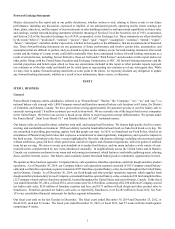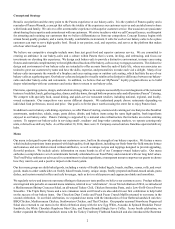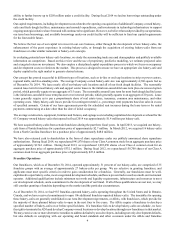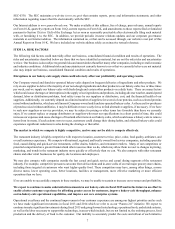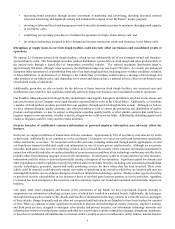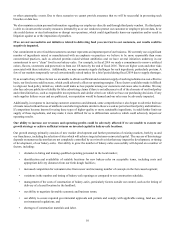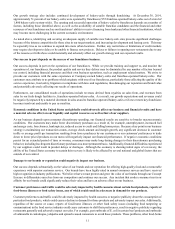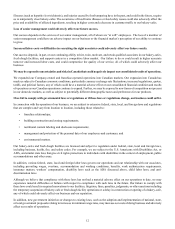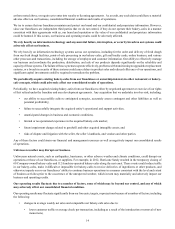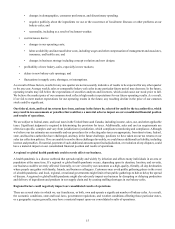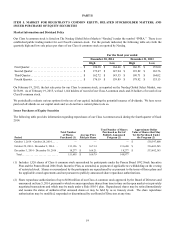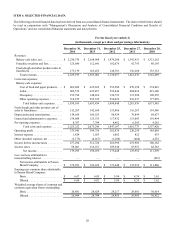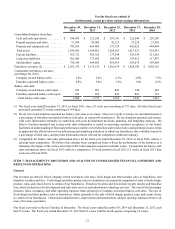Panera Bread 2014 Annual Report Download - page 23
Download and view the complete annual report
Please find page 23 of the 2014 Panera Bread annual report below. You can navigate through the pages in the report by either clicking on the pages listed below, or by using the keyword search tool below to find specific information within the annual report.11
Our growth strategy also includes continued development of bakery-cafes through franchising. At December 30, 2014,
approximately 51 percent of our bakery-cafes were operated by franchisees (955 franchise-operated bakery-cafes out of a total of
1,880 bakery-cafes system-wide). The opening and successful operation of bakery-cafes by franchisees depends on a number of
factors, including those identified above, as well as the availability of suitable franchise candidates and the financial and other
resources of our franchisees such as our franchisees’ ability to receive financing from banks and other financial institutions, which
may become more challenging in the current economic environment.
As noted above, identifying and securing an adequate supply of suitable new bakery-cafe sites presents significant challenges
because of the intense competition for those sites in our target markets, and increasing development and leasing costs. This may
be especially true as we continue to expand into more urban locations. Further, any restrictions or limitations of credit markets
may require developers to delay or be unable to finance new projects. Delays or failures in opening new restaurants due to any
of the reasons set forth above could materially and adversely affect our growth strategy and our expected results.
Our success in part depends on the success of our franchisees business.
Our success depends in part on the operations of our franchisees. While we provide training and support to, and monitor the
operations of, our franchisees, the product quality and service they deliver may be diminished by any number of factors beyond
our control, including financial pressures and their own business operations, such as employment related matters. We strive to
provide our customers with the same experience at Company-owned bakery-cafes and franchise-operated bakery-cafes. Our
customers may attribute to us problems which originate with one of our franchisees, particularly those affecting the quality of the
service experience, food safety, litigation or compliance with laws and regulations, thus damaging our reputation and brand value
and potentially adversely affecting our results of operations.
Furthermore, our consolidated results of operations include revenues derived from royalties on sales from, and revenues from
sales by our fresh dough facilities to, franchise-operated bakery-cafes. As a result, our growth expectations and revenues could
be negatively impacted by a material downturn in sales at and to franchise-operated bakery-cafes or if one or more key franchisees
becomes insolvent and unable to pay us royalties.
Economic conditions in the United States and globally could adversely affect our business and financial results and have
a material adverse effect on our liquidity and capital resources as well as that of our suppliers.
As our business depends upon consumer discretionary spending, our financial results are sensitive to broader macroeconomic
conditions. Our customers may make fewer discretionary purchases as a result of, for example, unemployment, increased fuel
and energy costs, foreclosures, bankruptcies, reduced access to credit and falling home prices. Because a key point in our business
strategy is maintaining our transaction counts, average check amount and margin growth, any significant decrease in customer
traffic or average profit per transaction resulting from fewer purchases by our customers or our customers' preferences to trade
down to lower priced products on our menu will negatively impact our financial performance. If negative economic conditions
persist for an extended period of time or worsen, consumers may make long-lasting changes to their discretionary purchasing
behavior, including less frequent discretionary purchases on a more permanent basis. Additionally, financial difficulties experienced
by our suppliers could result in product delays or shortages. Although the economy is showing initial signs of a recovery, the
ability of the United States economy to sustain this recovery is likely to be affected by several national and global factors that are
outside of our control.
Damage to our brands or reputation could negatively impact our business.
Our success depends substantially on the value of our brands and our reputation for offering high-quality food and a memorable
experience with superior customer service. Our brands have been highly rated in annual consumer surveys and have received
high recognition in industry publications. We believe that we must protect and grow the value of our brands through our Concept
Essence to differentiate ourselves from our competitors and continue our success. Any incident that erodes consumer trust in or
affinity for our brands could significantly reduce their value and have an adverse effect on our business.
Customer preferences and traffic could be adversely impacted by health concerns about certain food products, reports of
food-borne illnesses or food safety issues, any of which could result in a decrease in demand for our products.
Customer preferences and traffic could be adversely impacted by health concerns or negative publicity about the consumption of
particular food products, which could cause a decline in demand for those products and adversely impact our sales. Additionally,
regardless of the source or cause, reports of food-borne illnesses or other food safety issues (including food tampering or
contamination) in the food service industry could cause customers to shift their preferences, result in negative publicity regarding
restaurants generally and adversely impact our sales. For example, past outbreaks of E. coli in certain beef products and outbreaks
of salmonella in cantaloupes, jalapeños and spinach caused consumers to avoid these products. These problems, other food-borne


